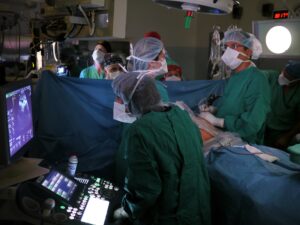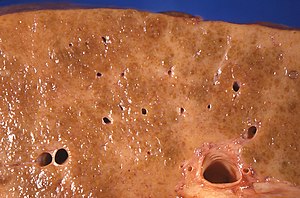
Gallbladder surgery is a common procedure in the US, with more than 750,000 gallbladders removed every year. While most people experience relief from their symptoms soon after the operation, some may be surprised to find that they are experiencing problems many years later. In this blog post, we will look at some of the issues that can arise after gallbladder removal, including digestive problems and pain. We’ll also discuss possible treatments and lifestyle changes that can help manage these issues.
Pain after Gallbladder Removal Years Later
Pain after gallbladder removal is often caused by scar tissue that forms around the bile duct. This scar tissue can block the flow of bile and cause pain. Treatment for this pain is typical with pain medications or surgery to remove the scar tissue.

Gallbladder Removal Surgery
The surgery to remove the gallbladder is called a cholecystectomy. This is usually done because of pain from gallstones. The surgery can be done with a small incision (laparoscopic cholecystectomy) or a large incision (open cholecystectomy).
After the surgery, you will have some pain and swelling. You may also have bruising. These should all go away in a few weeks.
You may have some problems digesting fatty foods for a while. This is because your body needs time to adjust to not having a gallbladder. Fatty foods can cause diarrhea, so you may need to avoid them or eat less of them.
You should be able to return to your normal activities within a few weeks. But it may take up to 6 weeks for your incisions to heal completely.

Gallbladder Removal: What to expect?
After having your gallbladder removed, it is not uncommon to experience some problems years later. The most common problem is diarrhea, which can be caused by the body not being able to properly absorb fats. This can be a real problem if you are not careful with your diet and eat foods that are high in fat.
Another common problem is a pain in the abdomen or back. This is usually caused by the scar tissue that forms after surgery. This scar tissue can sometimes block the bile ducts and cause pain. If this pain becomes severe, you may need to have another surgery to remove the scar tissue.
If you experience any of these problems, it is important to talk to your doctor about them so they can help you manage them.
Complications that can arise from gallbladder removal
There are a number of potential complications that can arise from gallbladder removal, both in the short and long term. In the short term, there is a risk of infection at the surgical site. There is also a risk of damage to the bile ducts or other nearby organs. In the long term, there is a small risk of developing diabetes or digestive problems.
Long-term Effects of Gallbladder Removal
The long-term effects of gallbladder removal can be both positive and negative. Taking in probiotics after gallbladder removal can help your body in transitioning.. On the positive side, many people report feeling better after having their gallbladder removed. Taking in vitamins after gallbladder removal helps your body too.. They have more energy and less pain. On the negative side, some people develop digestive problems such as diarrhea, constipation, and bloating.
When to see a doctor after gallbladder removal
If you have your gallbladder removed, it is important to know when to see a doctor after the surgery. Your doctor might recommend supplements after your gallbladder surgery.. There are a few different things that could happen in the weeks and months following your surgery.
Some people may experience pain in their abdomen or back. This is usually caused by gas buildup in the intestines. The pain should go away on its own within a few days.
Other people may have trouble digesting fats. This can cause diarrhea, bloating, and cramps. These symptoms usually improve over time, but if they persist, you should see a doctor.
Some people may also develop jaundice (yellowing of the skin) after gallbladder removal. If this happens, you should see a doctor right away as it could be a sign of a more serious problem.
Overall, it is important to listen to your body after gallbladder surgery as complications might occur after your gallbladder removal.. If you experience any pain, discomfort, or other new symptoms, be sure to see a doctor so that they can determine if there is anything wrong.

Explanation of Common Problems
There are a number of common problems that can occur after gallbladder removal, even years later. These include:
- Digestive problems such as diarrhea, constipation, bloating, and gas.
- Pain in the abdominal area, often related to digestive issues.
- Stones form in the bile ducts, which can cause pain and blockages.
- Liver damage, especially if there are stones present in the bile ducts.
While these problems can be frustrating and sometimes painful, they can usually be managed with medication and lifestyle changes. If you are having any difficulty after gallbladder removal, be sure to talk to your doctor about what options are available to you.
Steps to take to prevent problems after surgery
- Avoid fatty and greasy foods: Fatty and greasy foods can cause diarrhea and abdominal pain after gallbladder removal. Instead, focus on eating high-fiber foods like fruits, vegetables, and whole grains to help prevent these problems.
- Drink plenty of fluids: Drinking plenty of fluids helps to prevent constipation, which is a common problem after gallbladder surgery. Here’s a good list of what to eat after gallbladder surgery.. Be sure to drink at least 8 glasses of water per day to keep your body hydrated.
- Get regular exercise: Exercise helps to improve digestion and prevents constipation. Try to get at least 30 minutes of exercise every day, even if it’s just a brisk walk around the block.
- Take your vitamins: Vitamins are important for healing after surgery. Be sure to take a multivitamin every day and eat foods rich in vitamins A, C, and E to promote healing.
- Follow your doctor’s instructions: It’s important to follow your doctor’s instructions after surgery to ensure a smooth recovery. This includes taking all prescribed medications, attending all follow-up appointments, and avoiding strenuous activity until your doctor gives you the green light.

How to cope with the long-term effects of gallbladder removal
gallbladder removal is a common surgery, but there can be long-term effects. Here are some tips on how to cope:
- Talk to your doctor about any pain you experience. There may be a medication that can help.
- Watch your diet. Avoid fatty foods and eat plenty of fiber.
- Exercise regularly. This will help keep your digestive system working properly.
- Stay hydrated. Drink plenty of fluids, especially water, to avoid constipation.
Conclusion
Gallbladder removal can have long-term consequences, even after many years. It is important to talk to your doctor about any potential problems that may arise from the surgery and address them quickly in order to maintain a healthy lifestyle. Furthermore, ensuring that you are getting all of the vitamins and nutrients necessary for proper digestion will help lessen any issues associated with a lack of gallbladder function. Taking these precautions can go a long way toward improving your overall health and preventing health complications down the road.


Everyone loves what you guys are up too.
This kind of clever work and coverage! Keep up the very good works guys I’ve added you guys to
my own blogroll.
We are a bunch of volunteers and starting a new scheme in our community.
Your site provided us with helpful information to work
on. You have done a formidable activity and our whole group will
probably be grateful to you.
Definitely believe that which you stated. Your favorite
reason appeared to be on the net the easiest thing to be aware of.
I say to you, I certainly get irked while people think about worries that
they plainly don’t know about. You managed to hit the nail upon the top and defined out the whole thing without having
side effect , people can take a signal. Will likely be back
to get more. Thanks
I simply could not depart your website before suggesting that I actually
enjoyed the standard information an individual provide on your visitors?
Is going to be again frequently to inspect new posts
Wow, incredible blog layout! How lengthy have
you been blogging for? you make blogging glance easy.
The whole look of your website is fantastic, as smartly as the content material!
You can see similar: sklep internetowy and here sklep internetowy
Wow, awesome blog layout! How lengthy have you been blogging for?
you made blogging glance easy. The entire look of your website is excellent, as well as the content!
You can see similar: e-commerce and here najlepszy sklep
Woah! I’m really enjoying the template/theme of this blog.
It’s simple, yet effective. A lot of times it’s very hard to get that “perfect balance” between usability and visual appeal.
I must say you have done a fantastic job with this.
Also, the blog loads super quick for me on Safari.
Excellent Blog!
It’s perfect time to make a few plans for the longer term and
it’s time to be happy. I have learn this post and if I could I want to counsel you few
attention-grabbing things or advice. Maybe you can write next articles
relating to this article. I wish to read even more issues about it!
I saw similar here: sklep online and also
here: e-commerce
Excellent post but I was wanting to know if you could write a
litte more on this subject? I’d be very grateful if you could elaborate a little bit further.
Appreciate it!
Why visitors still make use of to read news papers when in this technological world the whole thing is existing on web?
I saw similar here: Sklep internetowy
I got this web page from my pal who informed me regarding this web
page and at the moment this time I am browsing
this web page and reading very informative articles at this time.
I saw similar here: Najlepszy sklep
Hey there! Do you know if they make any plugins to assist
with Search Engine Optimization? I’m trying to get my blog
to rank for some targeted keywords but I’m not seeing very good success.
If you know of any please share. Thanks! You can read similar text here:
E-commerce
It’s very interesting! If you need help, look here: ARA Agency
Hello! Do you know if they make any plugins to help with SEO?
I’m trying to get my blog to rank for some targeted keywords but I’m not seeing
very good success. If you know of any please share.
Many thanks! You can read similar text here: Sklep
Hi there are using WordPress for your site platform?
I’m new to the blog world but I’m trying to get started and create my own.
Do you need any coding knowledge to make your own blog? Any help would be really appreciated!
I’ll immediately snatch your rss feed as I can not to
find your e-mail subscription hyperlink or newsletter service.
Do you’ve any? Please allow me recognize so that
I could subscribe. Thanks.
Do you mind if I quote a few of your posts as long as I provide credit and sources back to your blog?
My blog is in the very same niche as yours and my users would definitely benefit
from some of the information you provide here.
Please let me know if this ok with you. Many thanks!
Hey! Do you know if they make any plugins to assist with Search Engine Optimization? I’m trying to get my blog to rank for some targeted
keywords but I’m not seeing very good gains.
If you know of any please share. Cheers! I saw similar article here:
Hitman.agency
Nice post. I was checking continuously this weblog and I’m inspired!
Extremely useful info specially the closing phase :
) I care for such information much. I was looking for this particular info for a
very lengthy time. Thank you and good luck.
Hey! Do you know if they make any plugins
to assist with Search Engine Optimization? I’m trying to get my blog to rank for
some targeted keywords but I’m not seeing very good results.
If you know of any please share. Cheers! You can read
similar art here: AA List
I get pleasure from, cause I found just what I was taking a
look for. You’ve ended my four day lengthy
hunt! God Bless you man. Have a great day. Bye
What’s up, I check your blog daily. Your writing style is witty, keep it up!
Your style is really unique compared to other people I’ve
read stuff from. I appreciate you for posting when you’ve got the opportunity, Guess I’ll just book mark this blog.
I was able to find good advice from your content.
Hi there, just wanted to mention, I enjoyed this post. It
was helpful. Keep on posting!
Good day! I could have sworn I’ve been to this website before but after reading through some of the post I realized it’s new to me.
Anyways, I’m definitely happy I found it and I’ll be book-marking
and checking back often!
Really when someone doesn’t be aware of afterward its up to other people that they
will help, so here it happens.
Excellent, what a weblog it is! This blog gives valuable information to us, keep it up.
I’m curious to find out what blog platform you happen to be working with?
I’m having some minor security issues with my latest website and I
would like to find something more safeguarded.
Do you have any suggestions?
I always spent my half an hour to read this weblog’s content
every day along with a cup of coffee.
Wow, amazing weblog format! How lengthy have you been running a blog for?
you make blogging glance easy. The entire look of your web site is magnificent, let alone the content material!
I saw similar here prev next and that was wrote by Crystle74.
Wow, incredible weblog layout! How lengthy have you ever
been blogging for? you made blogging look easy. The
full glance of your web site is fantastic, as well as
the content! I saw similar here prev next and those was
wrote by Bernie08.
I am curious to find out what blog platform you’re using?
I’m experiencing some small security problems with my latest website and I’d like to find something more safeguarded.
Do you have any recommendations?
Wow, superb weblog structure! How lengthy have you ever been blogging for?
you made blogging glance easy. The total glance of your website is fantastic, let alone the
content material! I saw similar here prev next and those was wrote by Esta01.
Wow, incredible blog structure! How long have you
ever been blogging for? you made blogging look easy.
The entire look of your website is wonderful,
let alone the content material! I saw similar here prev next and those was
wrote by Irving76.
Wow, awesome weblog layout! How long have you been blogging for?
you made running a blog glance easy. The full glance of your website is fantastic,
let alone the content material! You can see similar here Leigh
Koj9. 2024/04/23
I’ve been exploring for a little for any high-quality articles or blog posts on this kind of space .
Exploring in Yahoo I finally stumbled upon this web site.
Reading this info So i’m glad to express that I have a
very good uncanny feeling I discovered exactly what I needed.
I such a lot no doubt will make certain to do not put
out of your mind this website and provides it a glance regularly.